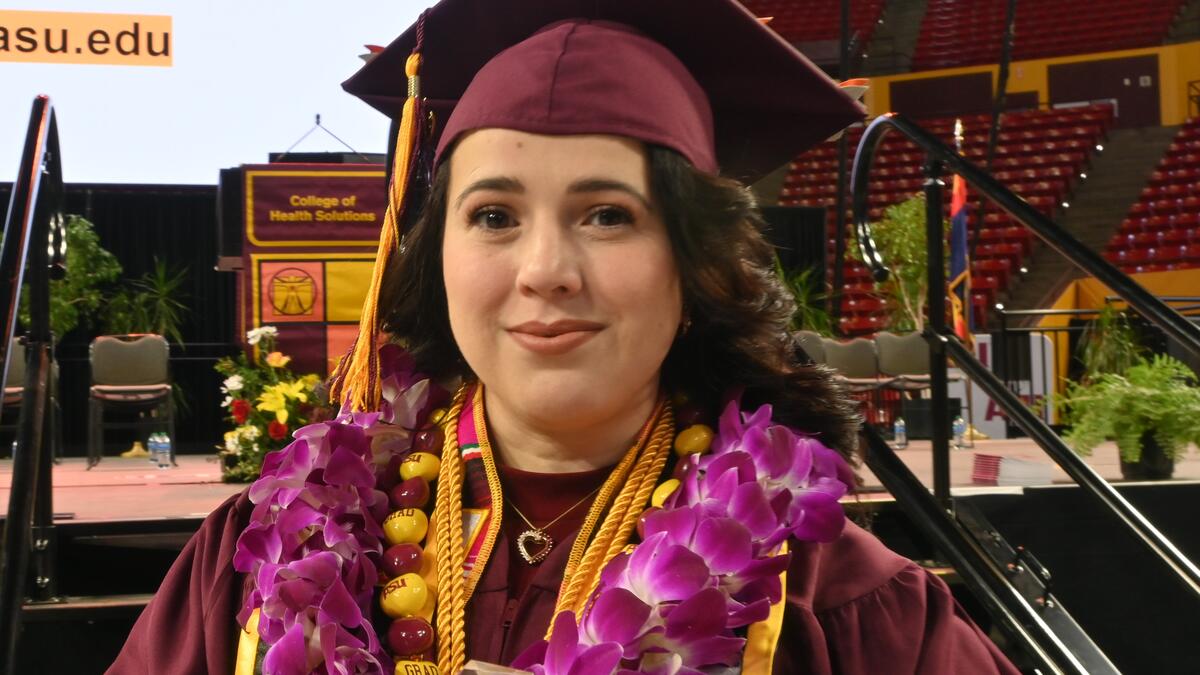College of Health Solutions online graduate finds way to 'literally help voices be heard'

Suzzel Alberto earned a bachelor's degree in speech and hearing science from ASU's College of Health Solutions. Courtesy photo
Editor’s note: This story is part of a series of profiles of notable fall 2023 graduates.
College of Health Solutions graduate Suzzel Alberto wants to make sure future and current ASU students know they can have a fulfilling college experience while earning their degree online.
Alberto, who earned a bachelor’s degree in speech and hearing science, made an impact by being involved with university life even though she was working from her home in Ontario, California.
Among her accomplishments, Alberto served as ASU chapter president of the National Society of Collegiate Scholars (she was the first online student to hold that position) and won the National Leadership Council Award from that organization.
Alberto secured a United Nations Millennium Fellowship, and out of 3,000 fellows, was one of six chosen to represent the fellowship at the United Nations Transforming Education Summit in New York in 2022.
She was also named Jose Ronstadt Outstanding Undergraduate Student during the ASU Hispanic Convocation, an event that honors the accomplishments of the school’s Hispanic students.
“I first applied to ASU for the online flexibility so I could be involved with my family and personal responsibilities,” Alberto said. “But I never expected that I’d have so many opportunities in academia and beyond.”
Completing her degree online had some advantages, including the support of her family and community. In particular, she credited her younger brother Julian with tech support and her older brother Rickey with sharing the benefits of his college experience.
Question: What was your “aha” moment when you realized you wanted to study the field you majored in?
Answer: As a daughter of political refugees from communist Cuba, I was raised with the constant reminder of the importance of my voice. From a young age I would offer my voice to other silenced communities through student governments, volunteering and peaceful protests. I always knew I wanted to work in the medical field and somehow be involved in politics. I first decided on my major in speech and hearing sciences because I finally found a way to literally help voices be heard.
Q: What’s something you learned while at ASU — in the classroom or otherwise — that surprised you or changed your perspective?
A: I originally enrolled in ASU with the belief that I was solely going to be a speech pathologist. As my journey with ASU progressed, I was motivated to go into cognitive neuroscience research and pursue a PhD. During the Black Lives Matter resurgence in the Civil Rights Movement, my academic advisor suggested I continue my path with a connection to my human rights passion; by the end of that day, I was registered as an ASU political science minor.
My academic advisor, Carole Gallucci, helped me in enrolling in my studies abroad as well as motivating me to always believe in myself and strive for excellence. She was my nominator for the Jose Ronstadt Outstanding Undergraduate Student Award. I am truly grateful for her.
Q: Why did you choose ASU?
A: I chose ASU after researching the top universities with a speech and hearing major. (After) finding how culturally diverse and innovative this university is, I needed no more reason to entice me to apply.
Q:Which professor taught you the most important lesson while at ASU?
A: As an online student, I thought I would have a very isolated experience, but these three professors made me feel seen and heard: Dr. Juliet Weinhold helped me to believe in myself in my capabilities within the speech and hearing community. (Clinical Assocaite) Professor Myra Schatzki motivated me to apply to MS/PhD programs. Dr. Gina Woodall goes above and beyond to get her students involved in learning, provide opportunities for them beyond the classroom and celebrates their accomplishments.
Q: What’s the best piece of advice you’d give to those still in school?
A: Always ask questions. Try new things. Don’t be afraid to learn beyond your focus of study. As a first-generation American and college student, I went into my higher education without guidance. By asking questions, staying after conferences and networking, I have accomplished what I have even as an online student.
Q: What are your plans after graduation?
A: I have applied to a handful of combined master's/PhD programs at different universities in cognitive neuroscience.
Q: If someone gave you $40 million to solve one problem on our planet, what would you tackle?
A: A vast array of thoughts come to mind when I think of this question, though none would be attainable without ... environmental sustainability. We need to save our planet to have a future to improve.
More Law, journalism and politics
Can elections results be counted quickly yet reliably?
Election results that are released as quickly as the public demands but are reliable enough to earn wide acceptance may not…
Spring break trip to Hawaiʻi provides insight into Indigenous law
A group of Arizona State University law students spent a week in Hawaiʻi for spring break. And while they did take in some of the…

LA journalists and officials gather to connect and salute fire coverage
Recognition of Los Angeles-area media coverage of the region’s January wildfires was the primary message as hundreds gathered at…

